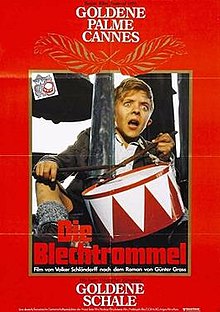The Tin Drum (film)
| The Tin Drum | |
|---|---|

Original film poster
|
|
| Directed by | Volker Schlöndorff |
| Produced by |
Franz Seitz Anatole Dauman |
| Written by | Volker Schlöndorff Jean-Claude Carrière Franz Seitz |
| Based on |
The Tin Drum by Günter Grass |
| Starring |
David Bennent Mario Adorf Angela Winkler Daniel Olbrychski Katharina Thalbach Charles Aznavour |
| Music by | Maurice Jarre |
| Cinematography | Igor Luther |
| Edited by | Suzanne Baron |
|
Production
company |
|
| Distributed by |
United Artists (West Germany) New World Pictures (US) |
|
Release date
|
|
|
Running time
|
142 minutes 162 minutes (Director's cut) |
| Country | West Germany Yugoslavia Poland France |
| Language | German Hebrew Italian Polish Russian |
| Box office | $2 million (US) |
The Tin Drum (German: Die Blechtrommel) is a 1979 film adaptation of the novel of the same name by Günter Grass. It was directed and co-written by Volker Schlöndorff.
The film won the Palme d'Or at the 1979 Cannes Film Festival and the Academy Award for Best Foreign Language Film in 1980 at the 52nd Academy Awards.
In 1899, Joseph Kolaizcek, the grandfather of Oskar Matzerath, the main character, is being pursued by the police through rural Kashubia. He hides underneath the skirts of a young woman named Anna Bronski, with whom he later has a daughter – Oskar's mother. He evades the authorities for a year, but when they find him again, he either drowns or escapes to America and becomes a millionaire.
Anna's daughter Agnes has two lovers: her cousin Jan Bronski, a Polish Post Office worker, and Alfred Matzerath, whom she marries. The two men are great friends. Agnes gives birth to a son, Oskar. Oskar's father is uncertain; Oskar himself believes he is Jan's son.
On Oskar's third birthday, he is given a tin drum. He decides to stop growing and throws himself down the cellar stairs. From that day on, he does not grow at all. Oskar discovers that he can shatter glass with his voice, an ability he often uses whenever he is upset. Oskar's drumming also causes the members of a Nazi rally to start dancing. During a visit to the circus, Oskar meets Bebra, a performing dwarf to whom he can relate.
When Alfred, Agnes, Jan and Oskar are on an outing to the beach, they see an eel-picker collecting eels from a horse's head used as bait. The sight makes Agnes vomit repeatedly. Alfred buys some of the eels and prepares them for dinner that night. When he insists that Agnes eat them, she becomes distraught and retreats to the bedroom. Jan enters and comforts her, all within earshot of Oskar who is hiding in the closet. She calmly returns to the dinner table and eats the eels. Over the next few days, she binges on fish. Anna Bronski helps reveal that Agnes is worried her pregnancy is due to her relations with Jan. In anger, Agnes vows that the child will never be born. She dies, though the cause is never revealed. At the funeral, Oskar encounters Sigismund Markus, the kindly Jewish toy seller who supplies him with replacement drums, and who was also in love with Agnes. Markus is ordered by two of the mourners to leave because he is Jewish; Nazism is on the rise, and the Jewish and Polish residents of Danzig (Gdańsk) are under increasing pressure. Markus later commits suicide after his shop is vandalized and a synagogue is burned down by SA men.
...
Wikipedia
